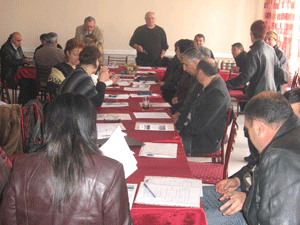 Gulo Kokhodze, Akhalkalaki
Gulo Kokhodze, Akhalkalaki
A Samtskhe-Javakheti regional conference was held in the town of Akhalkalaki. The conference was dedicated in its title to “Patience, Tolerance and Civil Integration.” As a result, civil society representatives adopted a joint resolution upon the conclusion.
“We have gathered in order to discuss openly and sincerely the problems this region is facing,” said Mikheil Kolikid, co-chairperson of Javakheti Civic Forum.
The conference was attended by the representatives of Ninotsminda and Akhalkalaki, including bodies of self governance, local NGOs, school teachers as well as journalists.
The conference participants discussed the most pressing problems of Javakheti region those living there, especially the grave social conditions and problems with the lack of education were among the most pressing problems discussed.
The conference organizers and participants adopted a resolution, and they are now planning to present the resolution to responsible governmental bodies. The resolution highlights 5 basic problems that the Central government must pay special attention, and the list includes the following for the inhabitants of the Samtskhe- Javakheti region.
1. Too little attention is paid to the learning of Georgian as the State language;
2. The dialogue between ethnic majority and minorities does not reflect the situation in the country. It is desirable if the ethnic minorities would be actively involved in decision- making process in Tbilisi when it comes to issues of ethnic minorities;
3. Not knowing state language prevents ethnic minorities from being able to find a job, which affects their financial conditions of families among the ethnic minorities and they are forced to emigrate to other countries;
4. Together with teaching state language intensively, and to take active steps at the same time to protect the Armenian language;
5. It is necessary to establish a round table which will discuss following issues: preparation of teachers for public schools, creation of Georgian-Armenian faculty in a state university operating in Javakheti.
The ethnic minorities that live in Akhalkalaki and Ninotsminda towns can not fully integrate into the Georgian society and as a consequence they are leaving these towns in mass. “Mostly elderly people stay behind. People do not know state language and there are few work places available, and even there is a lack of employment for the kind of jobs that do not require knowing Georgian language. People are not integrated and they continue to leave this region for other places where they can earn a living,” says Mikheil Kolikid.
The conference participants hope that after having introduced the resolution to state bodies the government will pay more attention to the problems highlighted in the resolution and react quickly to solve them.



